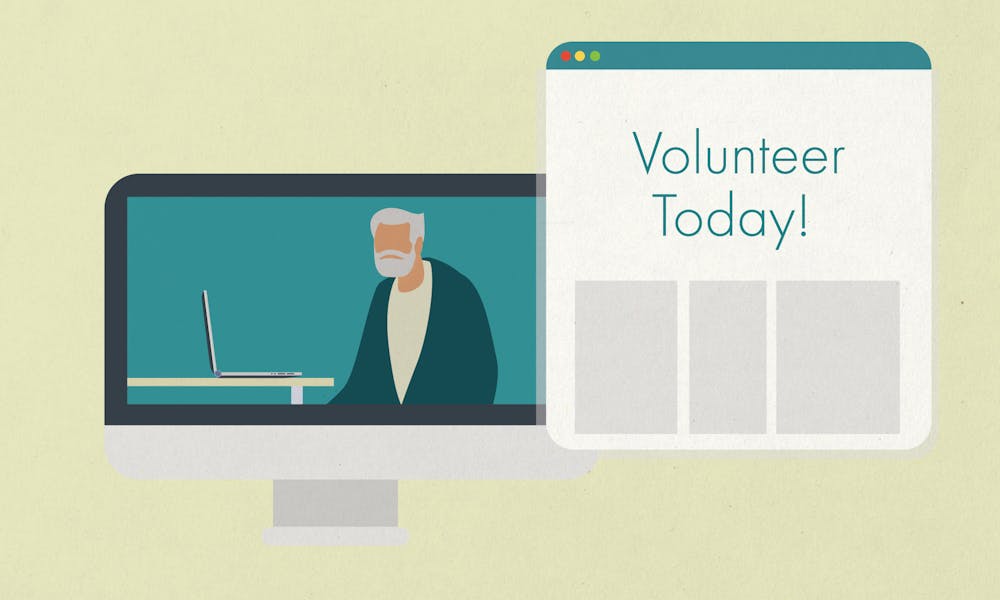
With finals wrapping up, many summer opportunities canceled, and stay-at-home orders largely still intact, many students find themselves with extra time on their hands. To help fill that free time, a team of four undergraduates started an online platform to connect students with volunteering opportunities to help people in light of the coronavirus pandemic.
Corona Connects, named for its mission to connect volunteers with organizations in need, was co-founded by three Penn seniors and one junior from University of Maryland. The website features over 100 opportunities, through which volunteers can filter their preferences by interests and availability, as well as a digital form for organizations to submit their requests. Volunteering opportunities include tutoring, food delivery, and letter-writing.
“The need is unprecedented,” College senior and Corona Connects president Hadassah Raskas said. “Whether it’s elderly citizens who are facing social isolation, nonprofits who need help getting online, or food pantries who need extra volunteers, as lots of food pantry volunteers are elderly citizens who can’t volunteer right now.”
Although Corona Connects was originally marketed to college students deprived of volunteering opportunities at school, Raskas said the platform is open to people of a variety of ages and geographic locations, as many opportunities are remote and the in-person opportunities span multiple states.
Raskas was motivated to start the project after hearing of many students who wanted to devote their time to volunteering, but were not sure where to begin their search.
“Our goal is to bridge the gap between those who want to volunteer, but can’t find the opportunities, and the organizations that are in need of those opportunities,” she said.
Raskas added that the group's tagline is “COVID-19 spreads through droplets, but kindness spreads through connecting.”
Wharton senior and product director Megan Kyne said the team consulted service organizations at Penn and utilized social media to raise awareness for the initiative. She added that the group has received positive feedback.
“Once the site was launched, multiple people reached out to me and said, ‘this is awesome,’ and wanted to help, so it’s exciting to see that kind of response,” she said.
The founders have recruited a growth and web development team, a social media team, and a team of regional coordinators, who are tasked with seeking out volunteering organizations that would like to be involved.

College sophomore Hannah Erdogan serves as the regional coordinator for Bucks County, Pennsylvania. She said she learned of the initiative through her work as president for Penn Undergraduates for Refugee Empowerment, one of the service groups on campus to which Raskas reached out.
Erdogan connected the team with the African Family Health Organization, a group that “provides culturally and linguistically sensitive health, human, and educational services to African and Caribbean immigrants/refugees,” according to its website.
“The [AFHO] director is on cloud nine,” she said, adding that more tutors have resulted in better one-on-one relationships between the children and volunteers. “We’ve already had three people reach out, and one is a college student in Canada, so you can see how far [Corona Connects] has reached people. I would call that a success story.”
She added that her personal experience tutoring has been very rewarding in just the three weeks she’s done it.
“You really feel like you’re making a difference, whether you’re in person or far away,” she said.
College junior Alexandra Jackman said she felt similarly after getting involved with Corona Connects. She said the initiative enabled her to expand Penn Best Buddies, an organization that facilitates friendships between students and residents with special needs, by seeking volunteers from people beyond Penn.
“It is such a confusing time for everyone, but social isolation from quarantining can be especially challenging for people with special needs,” she said. “The fact that there are a lot of people out there who recognize that and are willing to help, I really do think it makes a big impact.”
Raskas said numerous studies connect volunteering with positive mental health, and highlighted the initiative’s influence on building relationships with people, particularly in a time of increased isolation.
While the founders have spent most of their time so far organizing the initiative, they said they look forward to engaging in their own volunteering after final exams conclude.
"We're in a unique position with more time on our hands, and we can really step up and make a difference," Raskas said. "We want to make this a platform that makes you want to volunteer over and over again.”
The Daily Pennsylvanian is an independent, student-run newspaper. Please consider making a donation to support the coverage that shapes the University. Your generosity ensures a future of strong journalism at Penn.
Donate







